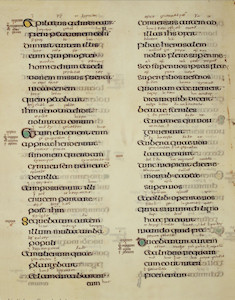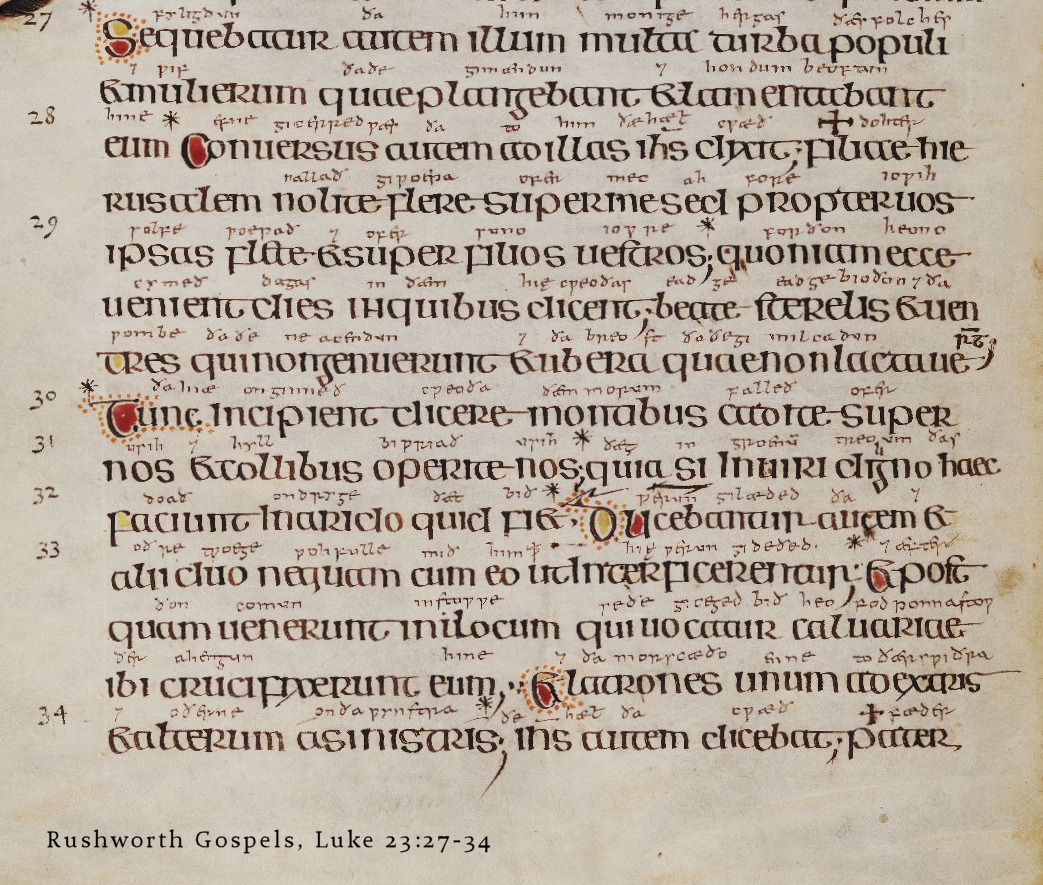The Northumbrian Gloss of the Gospels
 The Northumbrian Gloss on the Gospels is an interlinear Anglo-Saxon translation added to the famous Lindisfarne Gospels manuscript sometime during the tenth century. It is called the “Northumbrian” gloss because it represents the form of Anglo-Saxon spoken in the region of Northumbria, north of the river Humber. This gloss has been called the earliest surviving example of the Gospel text in any form of the English language; but it is not, properly speaking, a version of the Gospels. It is merely a crib to the Latin text, strictly adhering to the Latin word-order and idoms, and so it does not reflect the syntax and idioms of Anglo-Saxon. It is not comprehensible apart from the Latin, and was not intended to be used as an independent version. At that time, English monks were required to recite the Psalms and other portions of Scripture in Latin, but their knowledge of Latin must have been at a rather low level.
The Northumbrian Gloss on the Gospels is an interlinear Anglo-Saxon translation added to the famous Lindisfarne Gospels manuscript sometime during the tenth century. It is called the “Northumbrian” gloss because it represents the form of Anglo-Saxon spoken in the region of Northumbria, north of the river Humber. This gloss has been called the earliest surviving example of the Gospel text in any form of the English language; but it is not, properly speaking, a version of the Gospels. It is merely a crib to the Latin text, strictly adhering to the Latin word-order and idoms, and so it does not reflect the syntax and idioms of Anglo-Saxon. It is not comprehensible apart from the Latin, and was not intended to be used as an independent version. At that time, English monks were required to recite the Psalms and other portions of Scripture in Latin, but their knowledge of Latin must have been at a rather low level.
Shortly after it was added to the Lindisfarne Gospels, this gloss was used as the basis for another interlinear gloss added to the Gospels of Mark, Luke and John in the Rushworth Book of the Gospels, also called the MacRegol Gospels. This is a manuscript of the Latin Vulgate version of the four Gospels, written about the year 800 a.d. by a monastic scribe named MacRegol. MacRegol’s Latin text contains such strange errors of transcription as could only have been made by one who is unfamiliar with the language. The monks evidently needed the Anglo-Saxon gloss to understand the text, and so towards the end of the tenth century the gloss was added to the manuscript by two men, named Farman and Owun. Farman, who came from Mercia rather than Northumbria, glossed the Gospel of Matthew in the Mercian dialect; Owun completed the work with the Northumbrian gloss. This gloss also shows ignorance of Latin at many points, but it sometimes represents the Vulgate more correctly than the faulty Latin text of the codex does. It must have been copied from another source. A comparison of this Anglo-Saxon gloss with that of the Lindisfarne Gospel manuscript shows that they are related in some way, although not identical. The Rushworth Gospels are of interest to scholars today chiefly on account of this gloss, because it is one of our few sources of information about the Northumbrian dialect of Anglo-Saxon language in the tenth century. The whole manuscript serves to indicate what little knowledge of Latin the priests and monks of Northumbria had during this period.
A full description of this codex, including details of its historical context, its Latin text and Anglo-Saxon-gloss, is given by George Waring in the Preface and Prolegomena of The Lindisfarne and Rushworth Gospels, Part IV, in the series Publications Surtees Society vol. 48 (1865). The entire manuscript may be seen online at the website of the Bodleian Library, where it is designated MS. Auct. D. 2. 19.
Reproduced below is a section of one page of the Rushworth Gospels, containing Luke 23:27-34, followed by a transcription of the Latin text and the Anglo-Saxon gloss. For the “Tironian et” or ampersand of the Anglo-Saxon scribe (standing for ond, “and”) I use the character “7,” and for the “crossed thorn” abbreviation (standing for þæt/ðæt, “that”) I use a thorn character with a line through it. It will be noticed that the glossator uses Hæl as an abbreviation for Hæland, “Saviour,” where the Latin text has the abbreviation Ihs for the name of Jesus. —M.D.M.

| fyligdun | ða | him | monige | hergas | ðæs folches |
| Sequebatur | autem | illum | multa | turba | populi |
| 7 | ƿif | ðaðe | gimændun | 7 | hondum beoftun |
| et | mulierum | quae | plangebant | et | lamentabant |
| hine. | efne | gicerred ƿæs ða | to | him | ðæ Hæl | cƿæð, | dohter | |
| eum. | Conversus | autem | ad | illas | Ihs | dixit; | filiae | hie- |
| nallað | giƿoepa | ofer | mec | ah | fore | ioƿih |
| rusalem | nolite | flere | super | me | sed | propter | vos |
| solfe | ƿoepað | 7 | ofer | suno | ioƿre. | forðon | heono |
| ipsas | flete | et | super | filios | vestros; | quoniam | ecce |
| cymeð | dagas | in | ðæm | hiæ cƿeoðas | eadge | eadge bioðon | 7 | ða |
| venient | dies | in | quibus | dicent; | beatae | sterelis | et | ven- |
| ƿombe | ðaðe | ne | acendun | 7 | ða breost | ðaðe | | gimilcadun. |
| tres | qui | non | genuerunt, | et | ubera | quae | non | lactaverunt; |
| ða hiæ | onginneð | cƿeoða | ðæm morum | falleð | ofer |
| Tunc | incipient | dicere | montibus | cadite | super |
| usih | 7 | hyll | biƿriað | usih. | ðæt | in | groenu~ | treoum | ðas |
| nos | et | collibus | operite | nos; | quia | si | inviri | digno | haec |
| doað | on | dryge | ðæt | bið. | ƿerun gilæded | ða | 7 |
| faciunt | in | arido | quid | fiet? | Ducebantur | autem | et |
| oðre | tƿoege | ƿohfulle | mið | him | þ | biæ ƿerun gideðed. | 7 | æfter |
| alii | duo | nequam | cum | eo, | ut | interficerentur; | Et | post- |
| ðon | comun | in | stoƿƿe | seðe | giceged bið | heofodponna stoƿ |
| quam | venerunt | in | locum | qui | vocatur | calvariae |
| ðer | ahengun | hine | 7 | ða morscæðo | enne | to | ðær sƿiðra |
| ibi | crucifixerunt | eum; | Et | latrones | unum | a | dextris |
| 7 | oðerne | on | ða ƿynstra, | ðe Hæl | ða | cƿæð | fæder |
| et | alterum | a | sinistris; | Ihs | autem | dicebat; | pater |
English translation:
27 And there followed him a great multitude of people, and of women, who bewailed and lamented him.
28 But turning to them Jesus said: Daughters of Jerusalem, weep not over me; but weep because of yourselves, and over your sons.
29 For behold, the days shall come, wherein they will say: Blessed are the barren, and the wombs that have not borne, and the paps that have not given milk.
30 Then shall they begin to say to the mountains: Fall upon us; and to the hills: Cover us.
31 For if in the green tree they do these things, what shall be done in the dry?
32 And there were also two other malefactors led with him to be put to death.
33 And when they were come to the place which is called Calvary, they crucified him there; and the robbers, one on the right hand, and the other on the left.
34 And Jesus said: Father …

 The Northumbrian Gloss on the Gospels is an interlinear Anglo-Saxon translation added to the famous Lindisfarne Gospels manuscript sometime during the tenth century. It is called the “Northumbrian” gloss because it represents the form of Anglo-Saxon spoken in the region of Northumbria, north of the river Humber. This gloss has been called the earliest surviving example of the Gospel text in any form of the English language; but it is not, properly speaking, a version of the Gospels. It is merely a crib to the Latin text, strictly adhering to the Latin word-order and idoms, and so it does not reflect the syntax and idioms of Anglo-Saxon. It is not comprehensible apart from the Latin, and was not intended to be used as an independent version. At that time, English monks were required to recite the Psalms and other portions of Scripture in Latin, but their knowledge of Latin must have been at a rather low level.
The Northumbrian Gloss on the Gospels is an interlinear Anglo-Saxon translation added to the famous Lindisfarne Gospels manuscript sometime during the tenth century. It is called the “Northumbrian” gloss because it represents the form of Anglo-Saxon spoken in the region of Northumbria, north of the river Humber. This gloss has been called the earliest surviving example of the Gospel text in any form of the English language; but it is not, properly speaking, a version of the Gospels. It is merely a crib to the Latin text, strictly adhering to the Latin word-order and idoms, and so it does not reflect the syntax and idioms of Anglo-Saxon. It is not comprehensible apart from the Latin, and was not intended to be used as an independent version. At that time, English monks were required to recite the Psalms and other portions of Scripture in Latin, but their knowledge of Latin must have been at a rather low level.
